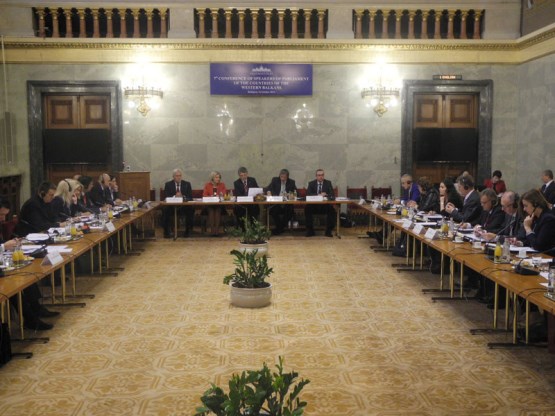10/16/2015
Speakers of both houses of the Parliamentary Assembly of Bosnia and Herzegovina Borjana Krišto and Bariša Čolak participated at the 7th Conference of Speakers of Parliaments of Western Balkans countries

The Speaker of the House of Representatives of the Parliamentary Assembly of Bosnia and Herzegovina, Borjana Krišto, and the Speaker of the House of Peoples of the Parliamentary Assembly of Bosnia and Herzegovina, Bariša Čolak, participated at the 7th Conference of Speakers of Parliaments of Western Balkans Countries, held today in Budapest and organized by the National Assembly of Hungary.
Ms. Borjana Krišto co-chaired the first session titled South East Europe on its Path towards the EU. In his speech, Ms. Krišto expressed her conviction that the European Union is not complete without the involvement of the Southeast European countries, and that, despite current objective difficulties, the policy of enlargement towards Southeast European countries will remain the focus of the EU.
Ms. Krišto also informed the participants that on 1st of June 2015 the Stabilization and Association Agreement entered into force in BiH, establishing a close partnership between the EU and Bosnia and Herzegovina and representing a significant marker of progress for the country.
Ms. Krišto pointed out that, as part of a more dynamic wave in EU accession efforts of BiH, the Parliamentary Assembly of Bosnia and Herzegovina, the Presidency of Bosnia and Herzegovina and leaders of political parties, adopted and signed in early 2015 the Declaration on European orientation and necessary reforms of the country on the path towards the EU. As Ms. Krišto explained, all institutions in Bosnia and Herzegovina, in accordance with their constitutional responsibilities, committed themselves to include in their work programmes all the necessary reforms for progress of Bosnia and Herzegovina in the EU association process.
As part of the session Current Security Challenges in South Eastern Europe, participants were addressed by the Speaker of the House of Peoples of the Parliamentary Assembly of Bosnia and Herzegovina, Bariša Čolak, who pointed out that the openness of borders, poverty, organized crime, religious issues, radicalism, terrorism and the intensification of forced migration are some of the global issues which have implications for South Eastern Europe.
According to the Mr. Čolak, there are no refugees on the borders of Bosnia and Herzegovina, but all agencies, departments and institutions are ready to react adequately if the refugees start to arrive in significant numbers.
Mr. Čolak stressed the importance of good co-operation between the countries of the region with a view to combatting international criminal activities, including those aimed at the promotion of any kind of terrorism by individuals or groups. Mr. Čolak informed the participants that Bosnia and Herzegovina has adopted the Strategy for the fight against terrorism and violent extremism, making it one of the first countries in the region to makeamendments to the Criminal Code so as to criminalize illegal establishment or joining of a paramilitary and police formations.
It was stated that the primary objective of the Western Balkan countries is membership in the European Union (EU) and that each of the countries are credible candidates for EU membership. Accordingly, it was added that all countries in the region should strive to meet the conditions for EU membership, and that these conditions can and ought to be met through joint efforts of the countries.
Views were exchanged on the issue of increased migrant and refugee flows to Europe and the challenge that this situation poses to the security of EU member states and Western Balkan countries. It was agreed that the migrant/refugee crisis cannot be solved by one country alone, irrespective of whether it is an EU member or not, but that this problem must be addressed jointly.
The Conference of the Speakers of Parliaments of the Western Balkans is organized every two years by the National Assembly of Hungary with the aim of promoting European and Euro-Atlantic integration and the concrete forms of assistance to the Western Balkans countries. (End)
|
PRESS
CONTACT |
Public relations department |

